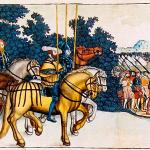I publish a lot on quite diverse topics. Through the years, I have devised a number of work strategies that work well for me, and in this blog I am going to pass on something that has proved extremely useful for me. If it works for you in approaching any topic – a book, a dissertation, an article, any kind of research – that is wonderful, and I hope you find this valuable. If not, pass on by.
These days, whenever I begin a topic, I always start with a bibliography. That may sound technical and pointless – isn’t that like starting a book with the footnotes? No it isn’t, and I’ll explain why. I’ll discuss why you should do a bibliography very early on in the process, and more important, the nuts and bolts of how to do it. Pardon me if I remark that I am good at that process, and I have some trade secrets to share with you.
Why A Bibliography Is A Basic Foundation For Research
I recently posted on my Baylor website a bibliography I have compiled on the theme of empire in US history, which you can download here. Although I say so myself, it is a good piece of work, and I have had some nice compliments on it from academics working in that general area. (My website also has sizable bibliographies on other topics, but let me focus on that empire one here). Download it and look at it. It runs to about 300 entries, which means that it is reasonably full, if not totally comprehensive, and it is heavily biased towards books and chapters rather than articles. But assume that you have something like this on any topic that might be of interest to you. What does it tell you? Why bother?
Here is a key takeaway. The act of compiling a bibliography is, or should be, a major part of the process of learning about the topic, any topic, and how it is presently being studied.
I began that bibliography with a specific goal. I have been working on how empires determine religious structures, and was exploring the possibility of writing a freestanding book on that topic in the specific case of American empires through history. Before actually embarking on writing the book, I had to do a kind of feasibility study, to determine what people already knew and didn’t know, and how my own work might fit – or was there actually nothing worthwhile left to say? That feasibility study took the form of a major bibliographical survey, which you now see before you. Think of the bibliography as the pre-book.
A bibliography maps the contours of the research field in question, and the more detailed and specific that map, the better. To take an obvious point, even a glance tells you who the main scholars are in the field, so you can identify them and follow their work. Such a cursory view also suggests what particular angles they are working on, and what the ongoing debates are.
If you know what people are working on in the field, you will see gaps that they are not really exploiting, and these are the areas where you might be able to carve out your own niche. But such a review can also offer a valuable warning, a wake-up call. On a couple of occasions, I have begun what I thought was a workable and valuable book project, and have duly commenced the bibliography. Looking at that bibliography as it emerged soon taught me that other scholars had said much of what I hoped and planned to say, leading me not to go forward with that original plan. Maybe some day I will find some other angle that would bring those projects back to life, but for right now, they are no-gos.
The Wonder of Searching!
The bibliography tells you what are the hot areas of work and writing in the field presently, something that is made easier by the wonderful capacity to SEARCH a document, whether in Word or pdf format. Just to take one example, just search “202” and see everything has been published on your topic since the year 2020. Useful, I think! In the case of my empire document, I can see immediately that 54 of the titles I cite have appeared just since 2020, indicating a really flourishing and active field. You can learn quite a bit from seeing which presses are publishing the current titles: are these the real academic heavy hitters, the big deal university presses? Do we also see a lot of trade publishers, suggesting a more popular interest? In the case of US empire, the answer to both questions is a resounding “yes!”
Even doing a rough and ready bibliography puts you a fair way towards accomplishing a formal literature review of the field, which you are very likely to need. That definitely applies if you are doing a dissertation, which is why it is never too early to start the process I am describing here.
That search capacity also means you can take a particular subset of the topic – say, US empire in a Philippine setting – and identify the main books on that easily. Search “Philippine”! (Or Puerto Rico, or whatever). It’s all right in front of you. Hmm, a search shows that my document has fifteen titles relating to US empire and the Philippines. That sounds like a manageable list.
When you have the bibliography laid out, you have gone a long way to organizing your agenda for reading and research in the coming months, as you actually delve into the works you have identified as significant. At least in broad outline, your work plan is set.
And Furthermore…
The bibliography has other virtues down the road. Imagine you are submitting a research funding proposal or a book proposal (in the humanities world, more likely the latter). It is a huge advantage to include a substantial bibliography of this kind, to show that you know the field well, and that you are not omitting obvious references. Reviewers will take note. They can’t say “It is appalling that Jenkins does not know the ground-breaking scholarship of Mary Jones” when (the imaginary) Dr. Jones is cited multiple times in the bibliography I am submitting with the proposal.
You should of course keep the bibliography up to date as you work, adding references as you find them, and as new items are published. You will stay up to date through the usual range of academic reviews, in print or online: H-NET REVIEWS are especially good in that regard. The virtue of this only becomes apparent when you are finalizing your project and adding references and footnotes, or indeed a full published bibliography to a book. You will be SO happy not to have to do all this from scratch!
So How Do You Make A Really Useful Bibliography?
Don’t reinvent the wheel. Start by seeing if Google will lead you to any kind of working bibliographies on the topic you are pursuing, eg US empire. Such items might be included in the college course syllabuses that some professors kindly put online. Use these as a basis of your new bibliography – although always always double check that the online references you are thus borrowing are accurate, which they sometimes are not. Trust but verify.
If you are interested in Topic X, then you assuredly know a couple of the major books in the field, preferably ones written recently. Look at the references that those distinguished authors cite, and incorporate them into your working document. You will very soon get a sense of who the key scholars are, and you can follow them up in a database.
The following may be obvious, but I am shocked how many people do not know it. As stage one in the process, get to know a good library database, which will usually belong to a major university. Each example has its own pluses and minuses, its own little quirks, so I usually focus on one or more that I know really well. Through force of habit, for me that means the Penn State library database, which anyone can access without showing credentials. You would need a formal Penn State affiliation to request or order materials, but for present purposes, you won’t need that. Baylor is also very good, but I happen to be comfortable with Penn State, and always start there.
I say that again: you can access the catalogs of many first class research libraries without having any formal connection with them whatever. Surprising as this may seem, I think all major libraries are just as hospitable as Penn State to “civilian” browsers, that is, to casual visitors not attached to the institution. Just at random, here is the search page for the University of Michigan. Use what you can get, and what works for you.
Typically for such sites, you find a landing search page where you can find material by title, author, or subject, and you can sort your results by date or relevance. Start by searching keywords, remembering that “empire” on its own is going to produce way too much, so you should use lots of variations – “American empire,” “US empire,” or whatever. Very few books are actually going to have the exact title, such as “American empire,” but even finding a couple of relevant books is great, because the individual entries will tell you the SUBJECT terms under which that title is classified. Then search those subject headings in turn. Through such a process of (near limitless) networking, you will rapidly find more books.
Links Lead to Links, Which Lead to Links…
I used the word “networking,” but the process of building a bibliography is also like a spider spreading its web. As you find new books, note the authors, and that allows you to link to their other publications, most or all of which are going to be directly relevant to your topic. It might well be that Mary Jones has edited a collection of essays on your topic. The catalog entry will probably (not necessarily) list all of the authors who contributed chapters to that collection, so search all those individual authors. Particularly if this is a recent collection, that already gives a list of a dozen or so active and rising scholars in the field, and you know the main things they are working on.
When you enter Mary Jones’s edited collection into your working bibliography, then if at all possible, include the titles and authors of each of the individual chapters, in a way you will not do in a formal bibliography at the end of the published book. That then means that all those authors and titles are available for Search.
I just offer one example largely at random. Here is my bibliography’s entry for one (excellent) collection of essays. I originally found the name of the collection at the university library website, then went to the publisher’s website for a full list of entries and authors. That combination of library and publishers is another good tactic, by the way: use it. Here is how I list the book:
Michael A. Blaakman, Emily Conroy-Krutz, and Noelani Arista, eds, The Early Imperial Republic: From The American Revolution To The U.S.-Mexican War (University of Pennsylvania Press, 2023). Contents:
Chapter 1. The Indian boundary line and the imperialization of U.S.-Indian Affairs / Robert Lee — Chapter 2. The sutler’s empire: frontier merchants and imperial authority, 1780-1811 / Susan Gaunt Stearns — Chapter 3. How native nations survived the imperial republic / Kathleen DuVal — Chapter 4. Catawba women and imperial land encroachment / Brooke Bauer — Chapter 5. An empire of Indian titles: private land claims in early American Louisiana, 1803-40 / Julia Lewandoski — Chapter 6. “A slave state in embryo”: Indian territory, native sovereignty, and the expansion of slavery’s empire / Nakia D. Parker — Chapter 7. American Protestant missionaries, native Hawaiian authority, and religious freedom in Hawai’i, ca. 1827-50 / Tom Smith — Chapter 8. “The colony must be broken up”: the Liberian settler “rebellion” of 1823-24 / Eric Burin — Chapter 9. Freedom in chains: U.S. Empire and the illegal slave trade / M. Scott Heerman — Chapter 10. An empire of illusions: Paul Cuffe, Martin Delany, and African American benevolent empire building in Africa — Chapter 11. Imperialism and the American imagination / Nicholas Guyatt — Chapter 12. Pax Americana? The imperial ambivalence of American peace reformers / Margot Minardi — Chapter 13. Mercenary ambivalence: military violence in antebellum America’s wars of empire / Amy S. Greenberg.
Right away, I have more than a dozen names of active scholars in the field, any or all of which I will then follow up to see what else they are producing. Again at random, I follow up on Nicholas Guyatt and go to his personal webpage, where I find the really impressive scholarly agenda he is pursuing. That includes references to several forthcoming publications. Or here is my former Penn State colleague Amy Greenberg.
The catalog entry for The Early Imperial Republic also gives me subject headings. And I can search my larger bibliography to see what else I have found on, say, “Liberia” or “merchants,” and see what patterns emerge.
Keywords
The most detailed search involves entering keywords, which can be overwhelming, and must be done selectively. If you hit, for instance, “empire and Philippine,” or “empire and Liberia,” this will produce every single catalog entry in which those two words appear, which can be a huge volume of information. But then limit that by date, and see just what has appeared in the past decade, say. That is a good working list, and again, you can search the authors who produced those volumes. Or suppose that searching “empire” alone produces, say, 5,346 results: Oh my Lord! But then limit by date, and just see the much more manageable results you can find from the past couple of years.
Be creative in those search terms. Even a small variation can lead you down other paths, eg “imperial” rather than “empire.”
I am here using the example of a very wide-ranging topic. Thrice blessed they who are studying some very specific place or person or topic, such as “Ecuador” or “Hasmoneans” or “Hieronymus Bosch” or “Akkad.” Books on those topics will be fewer and much easier to find. Limiting searches by date can still be a valuable tool.
Beyond the Library Catalogs
Don’t confine yourself to “official” databases! There will be numerous additional examples that might be commercially available, but which your university library happens not to have acquired. The best way to find these is via Amazon, where different search rules apply. The titles you find here will often be very recent.
Do note that Amazon exists in many different versions around the world, as I described in this recent blogpost. Use the information I offer there to search other sites such as Amazon.co.uk, which will give you recent books that are perhaps not yet available in the US, but which are already part of the academic conversation. So will amazon.ca (Canada).
I won’t try to be exhaustive here, but a couple of major points stand out. Above all, get to know an excellent library catalog at a very early stage of your project. And realize that although compiling that bibliography might seem burdensome, the rewards are just amazing.
And these days, that is how I begin any research project that I undertake.















